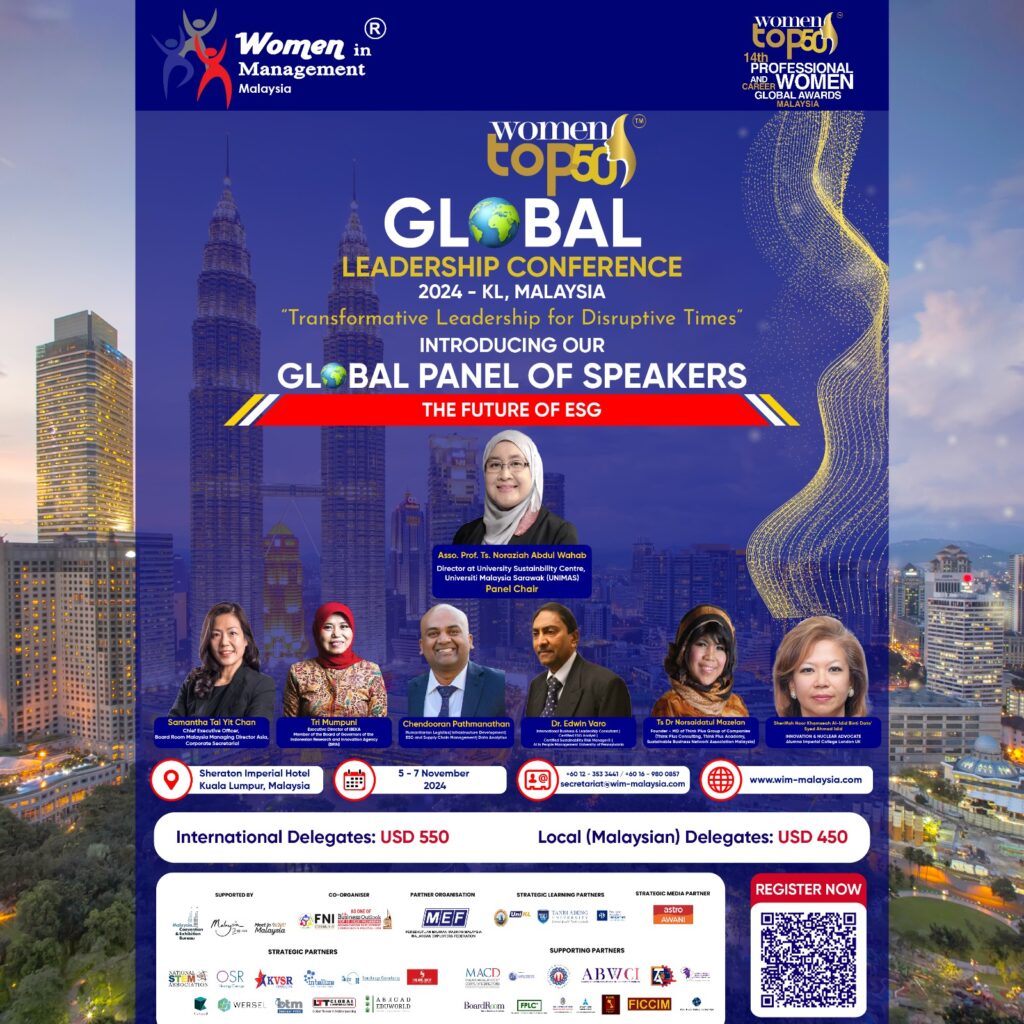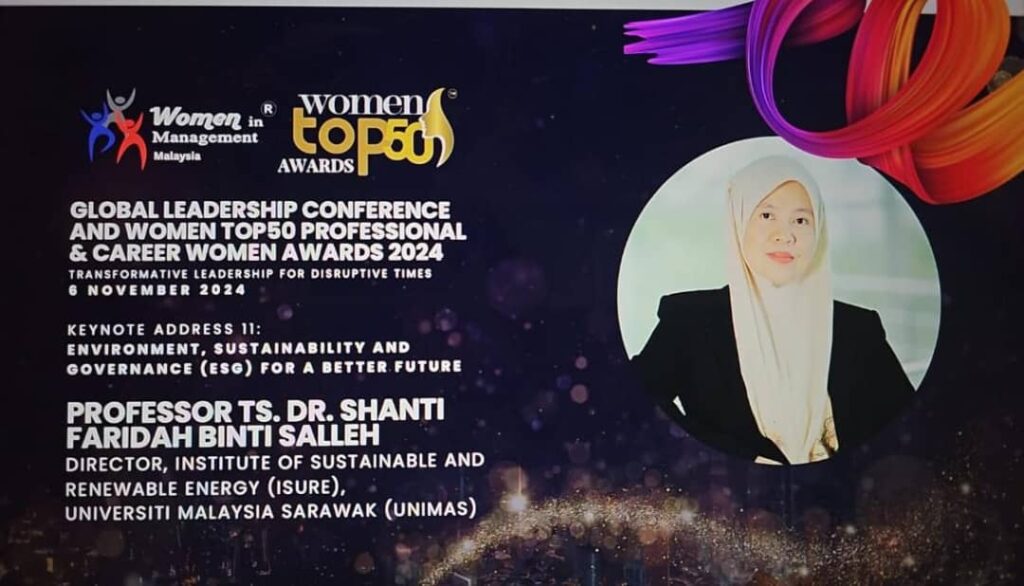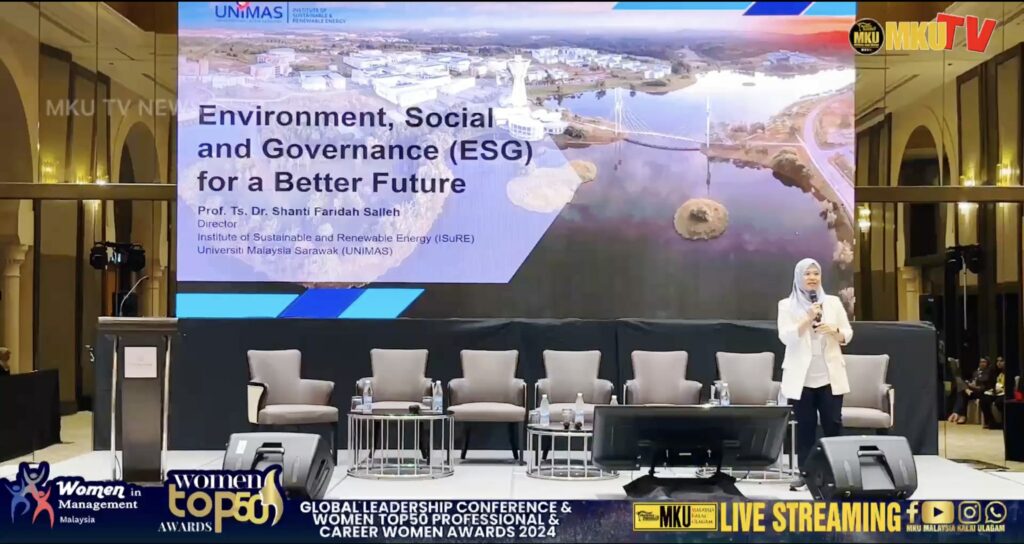
KUALA LUMPUR, MALAYSIA, 6 NOV 2024 – Universiti Malaysia Sarawak (UNIMAS) is taking significant strides in advancing Environmental, Social, and Governance (ESG) principles as a foundational component of sustainable development. UNIMAS reinforced its commitment to Sustainability Leadership through two impactful events: a transformative forum on “The Future of ESG” moderated by Associate Professor Ts. Noraziah bte. Datuk Haji Abdul Wahab, Director, University Sustainability Centre (USC), UNIMAS, and a keynote presentation entitles “ESG for a Better Future” by Prof. Ts. Dr Shanti Faridah bte. Salleh, Director, Institute of Sustainable and Renewable Energy (ISURE), UNIMAS, at the Global Leadership Conference held at the Sheraton Imperial Hotel Kuala Lumpur. The conference was organised by Women in Management Malaysia and had successfully attracted international participants from 15 countries.
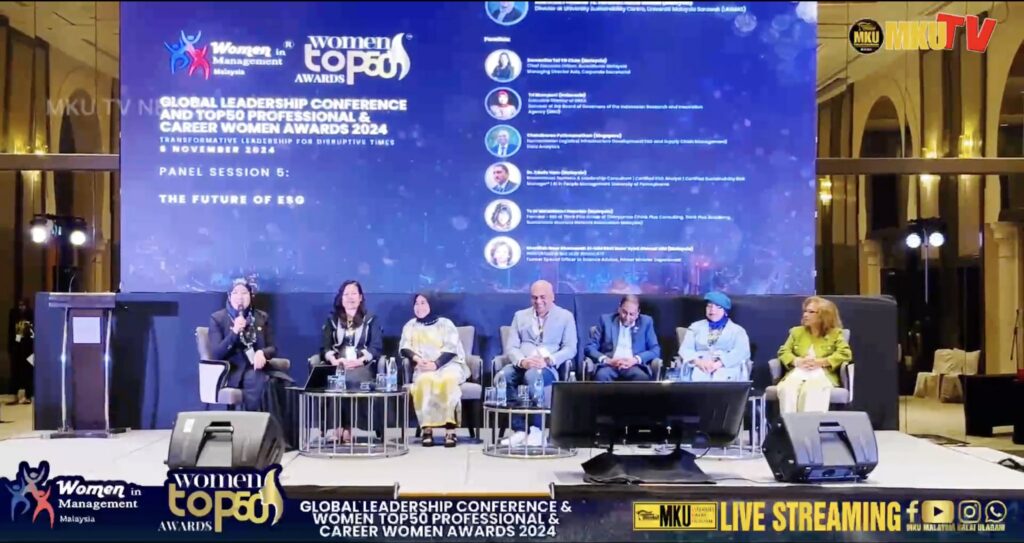
The forum on “The Future of ESG” brought together industry leaders and experts from Malaysia, Indonesia, and Singapore to discuss the evolution of ESG practices. The forum covered key ESG areas—environmental responsibility, social impact, and governance transparency—and explored the challenges and opportunities that lie ahead.
Panelists included:
- Mdm. Samantha Tai Yit Chan (Malaysia): CEO, BoardRoom Malaysia.
- Mdm. Tri Mumpuni (Indonesia): Executive Director of IBEKA.
- Mr. Chendooran Pathmanathan (Singapore): Specialist in Humanitarian Logistics and ESG.
- Dr. Edwin Varo (Malaysia): International Business Consultant and Certified ESG Analyst.
- Ts. Dr. Norsaidatul Mazelan (Malaysia): Founder and MD, Think Plus Group; and
- Mdm. Sheriffah Noor Khamseah Al-Idid Binti Dato’ Syed Ahmad Idid (Malaysia): Innovation & Nuclear Advocate, Former Special Officer to Science Advisor, Prime Minister Department.
ESG as a Strategic Imperative.
The forum commenced with a focus on ESG’s role in modern organizations. Mdm. Samantha Tai remarked on how ESG has revolutionized business operations, becoming a core consideration in decision-making. She said, “ESG is no longer an afterthought. It is now woven into the strategic fabric of leading companies, influencing everything from financial decisions to stakeholder engagement.”
Environmental Responsibility and Climate Action
Addressing environmental concerns, Mdm. Sheriffah discussed nuclear power’s potential role in sustainable energy and ESG frameworks. She highlighted nuclear as a low-carbon option for meeting climate goals, emphasizing its capacity to reduce dependency on fossil fuels and contribute to greener economies.
Social Impact: Diversity and Equity
Mdm. Tri Mumpuni addressed the social pillar of ESG, sharing insights from her work in Indonesia. She emphasized the importance of addressing diversity and social equity in corporate strategies, advocating for initiatives that foster positive societal change. “Organizations must look beyond profits to consider their impact on communities,” she said, underscoring best practices that include inclusive employment, community partnerships, and equitable resource distribution.
Governance and Transparency
The panel explored governance challenges, with Ts. Dr. Norsaidatul emphasizes the complexities of creating transparent and effective governance frameworks. “Trust is built on transparency,” she noted, “yet achieving consistent transparency across diverse sectors presents real challenges.” She explained that within organizations, various levels of intelligence—such as business intelligence, operational intelligence, and sustainability compliance—intersect, with system intelligence managing the integration. Each of these levels has its own sustainability and operational KPIs, which many internal systems struggle to coordinate, particularly when engaging with external stakeholders. Dr. Norsaidatul underscored the need for companies to understand and integrate these different competencies to establish clearer compliance frameworks and to implement technology-driven transparency measures that can strengthen ESG governance.
Digital Transformation: Technology in ESG
Dr Edwin Varo shared how digital advancements are reshaping ESG practices, with data analytics and AI driving improvements in reporting and decision-making. He pointed to AI’s ability to streamline data collection and enhance accuracy in sustainability reporting. “Digital tools allow organizations to predict, track, and measure ESG outcomes with greater precision, empowering better decisions,” Dr Varo stated.
Future of ESG: Emerging Trends
Looking forward, Mr. Chendooran Pathmanathan identified trends that are likely to shape ESG over the next decade, such as heightened regulatory pressures, increased emphasis on climate risk, and the integration of ESG with broader corporate strategies. He encouraged organizations to remain adaptive and proactive, advising, “Prepare for a landscape where ESG considerations are non-negotiable—aligning with these principles is essential for long-term resilience and relevance.”
Closing Thoughts
The session concluded with a single, powerful response that stressed the importance of a mindset shift toward responsible, purpose-driven leadership and an unwavering commitment to sustainability.
The forum underscored that ESG is not merely a trend but a transformative movement toward a sustainable, equitable future. The discussions inspired attendees to consider their roles in fostering responsible business practices within their industries and communities.
With its impactful dialogue and practical insights, the forum was a significant step forward in ESG education and advocacy, reminding everyone of the power of collective action in addressing global challenges.
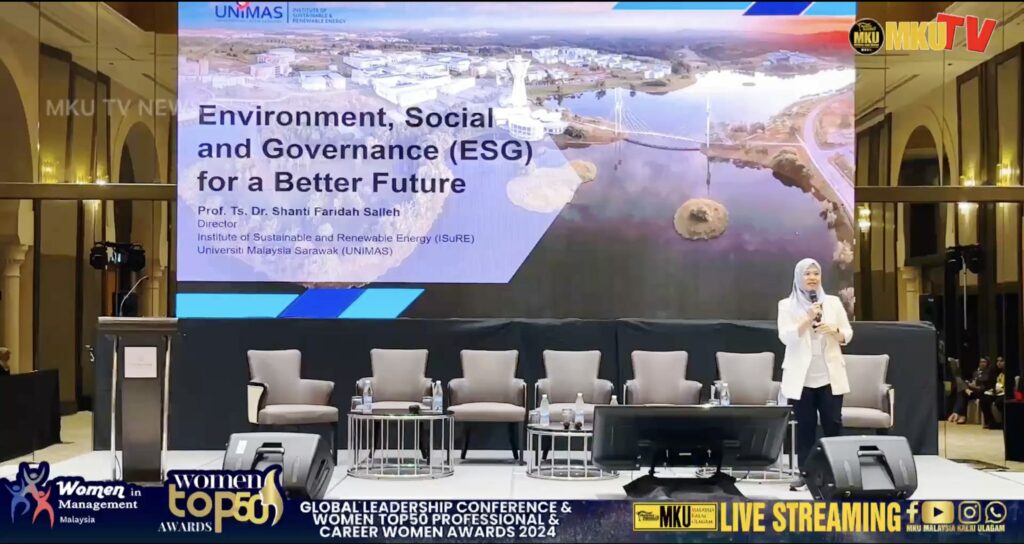
Adding to the discourse on ESG, Prof. Ts. Dr Shanti Faridah Salleh’s keynote, “ESG for a Better Future,” emphasized the transformative role of ESG as a strategic imperative for organizations globally. Prof. Ts. Dr Shanti shared insights on how ESG frameworks, standards, and innovative approaches are reshaping industries worldwide.
Highlights from the Keynote Address:
ESG Frameworks and Standards: Prof. Ts. Dr Shanti emphasized the importance of aligning with global ESG standards, which enable organizations to make impactful contributions across environmental, social, and governance dimensions.
Challenges in ESG Implementation: Addressing common challenges, she stressed that organizations must overcome regulatory obstacles and improve transparency and governance to meet ESG goals effectively.
A Pathway to Lasting Impact: Prof. Ts. Dr. Shanti encouraged organizations to view ESG as a driver of innovation and growth, emphasizing that ESG integration should be a core component of business strategies for sustainable and inclusive development.
These dual events mark a milestone in UNIMAS’s commitment to championing ESG as a pathway to positive societal impact and environmental stewardship. Through forums and global leadership engagements, UNIMAS continues to inspire meaningful change, fostering a resilient, responsible future for Malaysia and beyond.
UNIMAS’s commitment to ESG is evident not only in its thought leadership but also in its ongoing teaching & learning, research initiatives, partnerships, and community engagement programs that support sustainable development across communities and industries. UNIMAS produced its inaugural ESG Report in 2023 and by positioning ESG at the core of its vision and mission, UNIMAS leads the charge toward a resilient, responsible, and impactful future. UNIMAS is now at the final phase of its Sustainability Masterplan 2021-2025 and is aspiring to align its Sustainability Masterplan 2026-2030 with Sarawak Sustainability Blueprint which will be launched in 2025.
As a public university in Sarawak, UNIMAS is committed to play its inevitable role to contribute to Sarawak’s sustainability initiatives by strengthening its academic intelligence through sustainable and impactful research as well as putting these to practical applications through its strategic engagement with various stakeholders in making a transformative change for the communities. UNIMAS also integrates sustainability in its educational programmes at the university to ensure the future talent for Sarawak is equipped with relevant knowledge and skill sets for the future of ESG.
